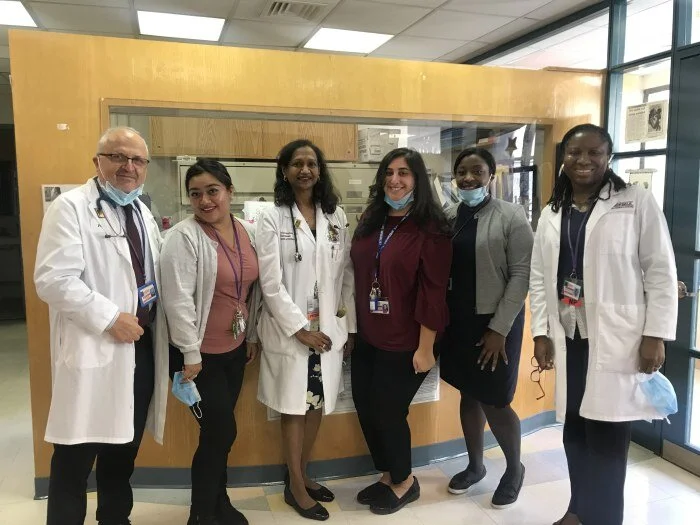
Healthcare Hero: Dr. Kusum Viswanthan
Show your support for heroes like Dr. Vis by making a donation in their honor or purchasing an ad in our digital journal.
Dr. Kusum Viswanthan, Pediatric Hematology-Oncology
Brookdale University Hospital Medical Center
Dr. Kusum Viswanathan is the Chair of the Department of Pediatrics at Brookdale Hospital Medical Center in Brooklyn, NY, and has been their Director of Pediatric Hematology/Oncology for over 25 years. Hematology/Oncology specialists treat conditions such as anemia, clotting disorders, sickle cell disease, hemophilia, leukemia and lymphoma.
Dr. Viswanthan's COVID-19 Story
Dr. Viswanathan, affectionately known as Dr. Vis, is a passionate physician, beloved and trusted by patients and parents alike at Brookdale University Hospital Medical Center.
She makes every child feel heard and understood, and although the pandemic made connecting with her patients more difficult, she didn’t let it stop her, using telemedicine to remain in contact with them.
Dr. Vis also kept a pulse on how people were being impacted during COVID-19, and witnessed the fear and challenges her patients and the community that Brookdale serves experienced over the last year.
Dr. Vis with a patient (pre-pandemic)
The hospital serves groups that have been hit especially hard by the pandemic, including vulnerable populations like patients with sickle cell disease, immigrant groups, Black and Brown people, and those living in low-income Brooklyn neighborhoods.
But Dr. Vis believes there is a light at the end of the tunnel. This light continues to shine brighter thanks to work done on the vaccination front by One Brooklyn Health System, the integrated, central health care delivery system in Central Brooklyn made up of Brookdale University Hospital Medical Center, Kingsbrook Jewish Medical Center and Interfaith Medical Center.
“Brookdale has been doing a tremendous job giving vaccines to the community,” Dr. Vis proudly shared.
However, for some people, including those in Black and Brown communities, there is a reluctance to get the vaccine. Dr. Vis thinks this can occur due to a lack of information and not enough of the right information. She understands the power of making reliable information easily available and the role it can play during a time like this.
The hospital took the initiative to provide data and offer guidance. They spoke with community groups and faith-based organizations, encouraging them to help educate their constituents about the importance of the vaccine. Brookdale also worked with them to make people aware of where and how they could receive the vaccine.
“The hospital did what it needed to do to deal with the pandemic and continues to play an important role in vaccinations.”
In an effort to offer more equitable access to everyone who qualifies and alleviate hesitancy in their community, Brookdale opened the vaccine to anyone who is eligible rather than requiring pre-registered appointments.
Dr. Vis lit up as she shared the tremendous number of staff, including doctors and nurses from her team, who have volunteered to help with the vaccine rollout. The dedication of the senior leadership at Brookdale to help the community get vaccinated has been inspirational. “It has been a labor of love.”
For Brookdale to be able to present information on COVID-19 to their patients and play a pivotal role in fixing that healthcare disparity with regard to getting people vaccinated is extraordinary.
COVID-19 at Brookdale
The Brookdale University Hospital Medical Center is a nonprofit 501(c)(3) medical services provider in the borough of Brooklyn. Brookdale’s primary and secondary service areas together comprise 1 million residents.
The hospital is located in Brownsville, in Eastern Brooklyn, one of the poorest neighborhoods in New York City. The Brooklyn borough was one of the hardest hit by the virus, according to city data.
Central Brooklyn is one of the most vulnerable areas in all of New York State, with measurably higher rates of obesity, diabetes and high blood pressure, limited access to healthy foods or opportunities for physical activity, high rates of violence and crime, wide economic disparities due to unemployment, and high poverty levels, and inadequate access to high quality health care and mental health services.
In order to accommodate the influx of adult patients, the hospital converted its pediatric emergency department into a Covid-19 isolation area.
Brookdale was the first hospital in Brooklyn to begin using a rapid COVID-19 test in their own lab: results took as little as 6 hours. Before, Brookdale was only able to test 50 patients a day. “Right now, we’re doing 300 a day. But we have the ability to go upwards of 500 patients a day“ explained Senior Vice President William Bifulco. (March 2020)
Pivoting During a Pandemic
During the COVID-19 pandemic, it became clear to Dr. Vis that people were scared to come to the hospital.
This meant that a lot of children who were scheduled for regular and routine visits did not come in as usual.
While she was happy that admissions to pediatrics units were down, she was concerned that there were patients who really needed to come in for care, but were not because parents were afraid to expose their children to the virus.
To prevent gaps in healthcare, Dr. Vis and her colleagues turned to telemedicine.
It took great effort on part of the institution and the pediatricians, but they knew it was vital for their patients. They became quite good at it, and were afforded the ability to focus on kids’ routine care while also maintaining connections with the patients and their families.
Although children were receiving care virtually and were testing positive for COVID-19 at much lower rates than adults, Dr. Vis shared there were still significant concerns.
“The numbers of children with COVID-19 were so much less than the numbers of adults, so I would say our bigger issue was how do we make sure that our children continue to get their immunizations on time and come for those important preventive measures that are important in pediatrics - it’s the core of pediatrics.”
She also worried about other ways the pandemic was affecting children, like the impact on a child’s education and mental health. Lack of access or availability of laptops or the internet may have caused gaps in education and self-confidence. As a physician, she is aware that she plays a big role in child development and healing.
“We as healthcare personnel should be cognizant and aware of that [education issues] and see what we can do to help our children get back into the scheme of things. What can we do as organizations or pediatricians to play a role in the development of the children in our community?”
Dr. Vis recalls the silver lining of the pandemic.
Their Sickle Cell Support Group for Children and Families Living with Sickle Cell Disease, funded by enCourage Kids, could now expand its capacity and reach more kids and families thanks to the transition to hold it virtually.
And it did! The number of patients doubled. This meant more children and parents could learn coping techniques for pain and have a dedicated space to share information and discuss the feelings and challenges that come with having sickle cell. In a time of heightened isolation, the group helped Brookdale offer the care their patients needed and made those who participated in it feel like family.
Dr. Vis credits her team for the support group’s success and explained that the group was included in Brookdale’s efforts in helping to vaccinate their community.
Their team discussed the vaccine with the families in a way that is easy to understand, explained how it works, why it works, and shared their experiences getting vaccinated themselves.
This is especially impactful for vulnerable patients like those with sickle cell disease.
The Pediatric Hematology-Oncology Team
enCourage Kids Support
Sickle Cell Support Group (pre-pandemic)
Since 2000, enCourage Kids has provided more than $204,000 in direct funding to Brookdale University Hospital Medical Center through our Pediatric Hospital Support Program.
In the past, this funding provided Brookdale with a child life specialist, ensuring that the pediatric medical team had someone dedicated to improving the psychosocial well-being of their young patients and ensuring the medical experience was as positive as possible.
Most recently, the funding has supported a monthly Support Group for children and families living with sickle cell disease, which helps patients of all ages understand sickle cell on a developmentally appropriate level. Within the safety of the support group environment, patients and families can freely express their anger, depression, guilt, and anxiety, and have those feelings validated by others and accepted as a normal response to living with sickle cell or living with someone who has sickle cell.
The biggest advantage of providing a support group is to help patients and their families realize that they are not alone and that there are other children who have the same chronic illness. The hope, joy, and support provided to pediatric patients and their families is palpable during every group session and carries on throughout their daily lives. They have continued to meet virtually during the pandemic.enCourage Kids has provided Entertainer Visits for patients at Brookdale over the last decade, which have been instrumental in offering therapeutic distraction, entertainment, normalcy, and joy during moments that can be stressful and scary.
In 2011, enCourage Kids renovated a treatment room, brightening the space where children have some of their most invasive and painful experiences. The room transformed from dull and intimidating to child-friendly and inviting. For the last 10 years, this has helped to minimize discomfort, anxiety, and fear.
Future Challenges
In discussions with our pediatric healthcare heroes, an important question emerged: what does the future hold?
The pandemic has brought to light a number of challenges that kids and pediatric patients may face in the next few months and even years.










